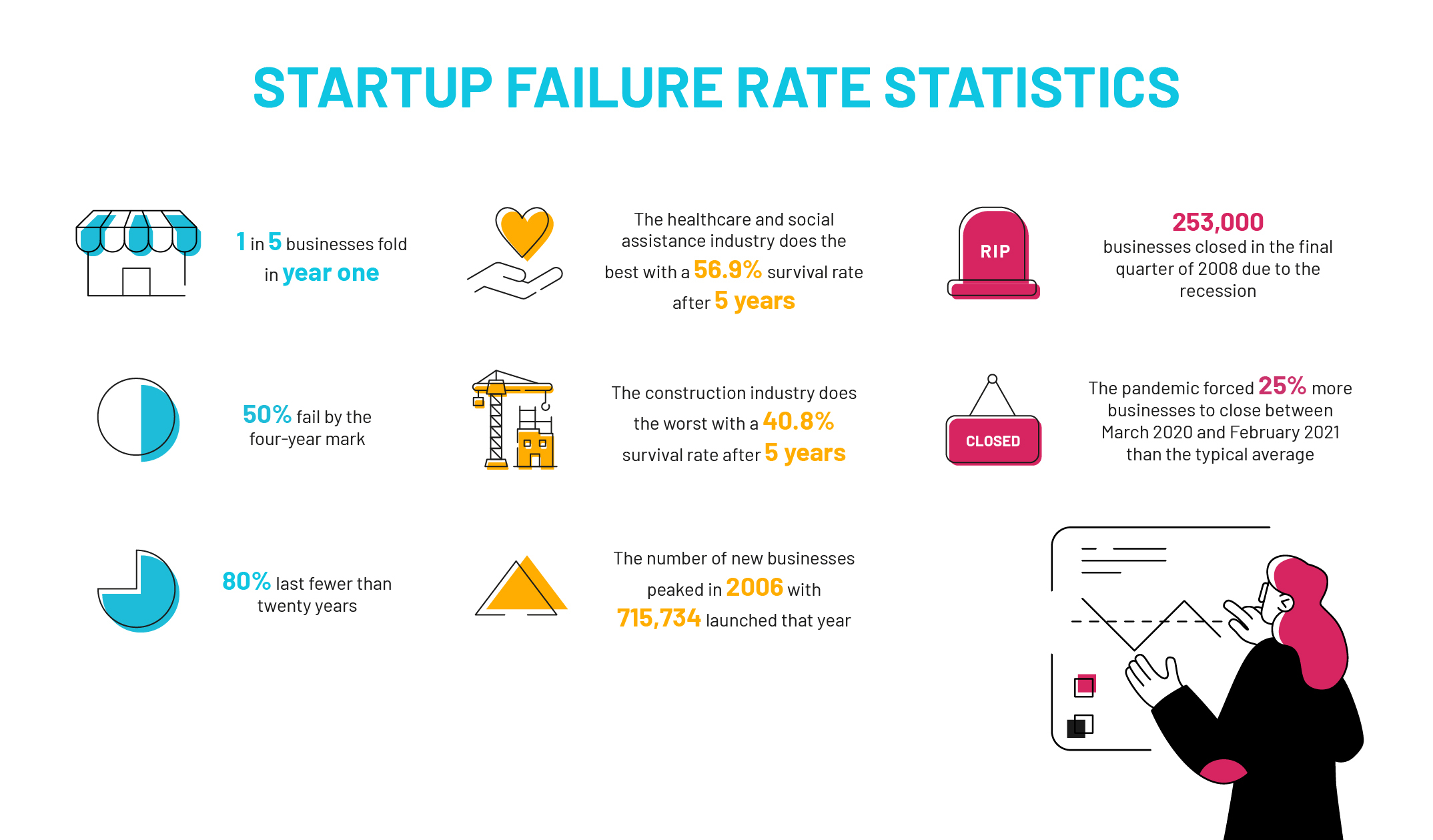The High Failure Rate Of Food Startups: Insights And Strategies For Success

Table of Contents
Common Reasons for Food Startup Failure
The food industry is notoriously challenging, and many aspiring food entrepreneurs stumble due to preventable mistakes. Understanding these common pitfalls is the first step towards building a resilient and thriving food business.
Lack of Market Research and Business Planning
Many food startups fail because they lack a solid foundation in market research and business planning. This crucial initial step sets the stage for success or failure.
- Insufficient understanding of the target market: Failing to define your ideal customer (demographics, preferences, needs) leads to ineffective marketing and product development.
- Inadequate competitive analysis: Underestimating or ignoring competitors leaves you vulnerable and unprepared for market dynamics.
- Unrealistic financial projections: Overly optimistic revenue forecasts and underestimated expenses lead to cash flow problems and eventual collapse.
- Absence of a comprehensive business plan: Lacking a detailed roadmap outlining your strategy, operations, marketing, and financial projections leaves you adrift.
Thorough market research is paramount. This involves identifying your target demographics, analyzing competitors’ strengths and weaknesses, conducting surveys, and testing your product or service with potential customers. Creating realistic financial models, including startup costs, operating expenses, and revenue projections, is equally critical. A well-defined business plan acts as your guiding document, outlining your vision, strategy, and milestones.
Poor Financial Management
Even with a great product, poor financial management can sink a food startup. This area requires meticulous attention to detail and proactive planning.
- Underestimating startup costs: Many underestimate the initial investment required, leading to funding shortages early on.
- Inadequate cash flow management: Poorly managing incoming and outgoing cash flow can lead to liquidity issues and inability to meet operational expenses.
- Lack of access to funding: Failing to secure adequate funding (loans, investors, bootstrapping) severely limits growth potential.
- Poor pricing strategies: Incorrectly pricing your products or services can lead to insufficient profit margins and financial instability.
Accurate budgeting is crucial. You need to meticulously calculate all startup costs, including equipment, ingredients, rent, marketing, and salaries. Secure sufficient funding through loans, grants, investors, or crowdfunding. Implement effective inventory management to minimize waste and optimize purchasing. Set profitable pricing strategies that consider your costs, market prices, and profit margins.
Operational Inefficiencies
Efficient operations are the backbone of a successful food business. Inefficiencies quickly erode profitability and can lead to customer dissatisfaction.
- Inefficient supply chain management: Unreliable suppliers, inconsistent ingredient quality, and logistical problems disrupt operations and impact product quality.
- Poor quality control: Inconsistent product quality leads to customer complaints and reputational damage.
- Inadequate staffing: Lack of appropriately skilled and motivated employees can hinder productivity and customer service.
- Lack of technology integration: Failing to leverage technology (POS systems, online ordering, inventory management software) limits efficiency and scalability.
A smooth and reliable supply chain is essential. Establish strong relationships with reliable suppliers and implement robust quality control processes at every stage, from sourcing ingredients to final product delivery. Invest in appropriately skilled employees and create a positive work environment to foster productivity and teamwork. Utilize technology to streamline operations, enhance efficiency, and improve customer experience.
Ignoring Marketing and Branding
A great product won't sell itself. Effective marketing and branding are crucial for attracting customers and building a loyal following.
- Lack of a clear brand identity: Failing to establish a distinct brand identity makes it difficult to connect with your target market.
- Ineffective marketing strategies: Poorly planned marketing campaigns fail to reach your target audience and generate sales.
- Weak online presence: Lack of a professional website and social media presence limits your reach and customer engagement.
- Failure to engage with customers: Ignoring customer feedback and failing to build relationships hinders loyalty and repeat business.
Creating a strong brand identity that resonates with your target market is paramount. Develop a comprehensive marketing strategy that encompasses social media marketing, online advertising, public relations, email marketing, and content marketing. Build a professional website and manage your online presence effectively. Actively engage with your customers, gather feedback, and adapt to their needs.
Strategies for Increasing Food Startup Success
While the high failure rate of food startups is a reality, success is achievable with the right approach. Here are key strategies to boost your chances:
Develop a Robust Business Plan
A comprehensive business plan is the cornerstone of any successful food startup. It serves as your roadmap to success.
- Detailed market analysis: Thoroughly research your target market, competition, and industry trends.
- Realistic financial projections: Develop accurate financial forecasts, including startup costs, operating expenses, and revenue projections.
- Clear operational plan: Outline your production process, supply chain, staffing needs, and operational procedures.
- Marketing strategy: Detail your marketing and branding strategy, outlining your target audience, marketing channels, and promotional activities.
- Contingency planning: Develop plans to address potential challenges and setbacks.
A well-structured business plan provides a clear direction, allowing you to make informed decisions and adapt to changing circumstances. It's also essential for securing funding and attracting investors.
Secure Adequate Funding
Securing sufficient funding is critical for covering startup costs and sustaining operations during the initial growth phase.
- Explore funding options: Consider loans, grants, investors (angel investors, venture capitalists), crowdfunding, and bootstrapping.
- Develop a compelling pitch deck: Prepare a concise and persuasive presentation to attract investors and secure funding.
- Manage finances effectively: Implement robust financial management practices to ensure efficient allocation of resources.
Thoroughly research available funding options and choose the most suitable path for your business. A strong pitch deck is crucial for attracting investors. Effective financial management is key to ensuring long-term stability and growth.
Build a Strong Team
Surrounding yourself with a skilled and dedicated team is crucial for success.
- Hire skilled employees: Recruit individuals with the necessary skills and experience to support your operations.
- Create a positive work environment: Foster a culture of teamwork, collaboration, and mutual respect to maximize productivity.
- Foster teamwork and collaboration: Encourage open communication, shared goals, and mutual support among team members.
Building a strong team with diverse skills and experience is essential for tackling the challenges of running a food business. A positive and supportive work environment fosters collaboration and boosts morale, leading to improved productivity and customer satisfaction.
Focus on Customer Experience
Prioritizing customer experience is crucial for building a loyal customer base and ensuring long-term success.
- Provide excellent customer service: Consistently exceed customer expectations through friendly, efficient, and personalized service.
- Build a loyal customer base: Develop strategies to cultivate customer loyalty, such as loyalty programs, personalized communications, and exclusive offers.
- Gather customer feedback: Actively seek customer feedback through surveys, reviews, and direct communication to identify areas for improvement.
- Adapt to customer needs: Continuously adapt your products, services, and operations based on customer feedback and market trends.
Focusing on providing exceptional customer service is key to building a strong reputation and creating a loyal customer base. Gathering and acting on customer feedback allows you to continuously improve and adapt to changing needs.
Conclusion
The high failure rate of food startups underscores the importance of thorough planning, strong financial management, efficient operations, and a customer-centric approach. Don't let the high failure rate of food startups deter you! With careful planning, strategic execution, and a relentless focus on your customers, you can increase your chances of building a thriving and sustainable food business. By implementing the strategies outlined above, you can significantly improve your chances of creating a successful food startup and achieving your culinary entrepreneurship dreams. Remember, a robust business plan, smart financial management, and a dedication to excellent customer service are essential ingredients for success in this challenging yet rewarding industry.

Featured Posts
-
 Seattle Police File Murder Charges Following Baker Park Shooting
May 29, 2025
Seattle Police File Murder Charges Following Baker Park Shooting
May 29, 2025 -
 Collect Them All The Pop Mart Arcane League Of Legends Blind Box Collection
May 29, 2025
Collect Them All The Pop Mart Arcane League Of Legends Blind Box Collection
May 29, 2025 -
 Bayrn Mywnkh Ela Aetab Alteaqd Me Jwnathan Tah
May 29, 2025
Bayrn Mywnkh Ela Aetab Alteaqd Me Jwnathan Tah
May 29, 2025 -
 Jordan Hosts Final Round Of 24th Chinese Bridge Competition
May 29, 2025
Jordan Hosts Final Round Of 24th Chinese Bridge Competition
May 29, 2025 -
 Pcc Community Markets Unexpected Profit Surge In 2024
May 29, 2025
Pcc Community Markets Unexpected Profit Surge In 2024
May 29, 2025
Latest Posts
-
 Oasis Tour Audit Did Ticketmaster Violate Consumer Protection Laws
May 30, 2025
Oasis Tour Audit Did Ticketmaster Violate Consumer Protection Laws
May 30, 2025 -
 Venue Virtual De Ticketmaster Revolucion En La Compra De Entradas
May 30, 2025
Venue Virtual De Ticketmaster Revolucion En La Compra De Entradas
May 30, 2025 -
 Urgent Warning Avoid Fake Ticket Sellers On Ticketmaster
May 30, 2025
Urgent Warning Avoid Fake Ticket Sellers On Ticketmaster
May 30, 2025 -
 Nuevo Venue Virtual De Ticketmaster Elige Tu Asiento Perfecto
May 30, 2025
Nuevo Venue Virtual De Ticketmaster Elige Tu Asiento Perfecto
May 30, 2025 -
 Ticketmaster Warning Fake Ticket Sellers Costing Punters Thousands
May 30, 2025
Ticketmaster Warning Fake Ticket Sellers Costing Punters Thousands
May 30, 2025
